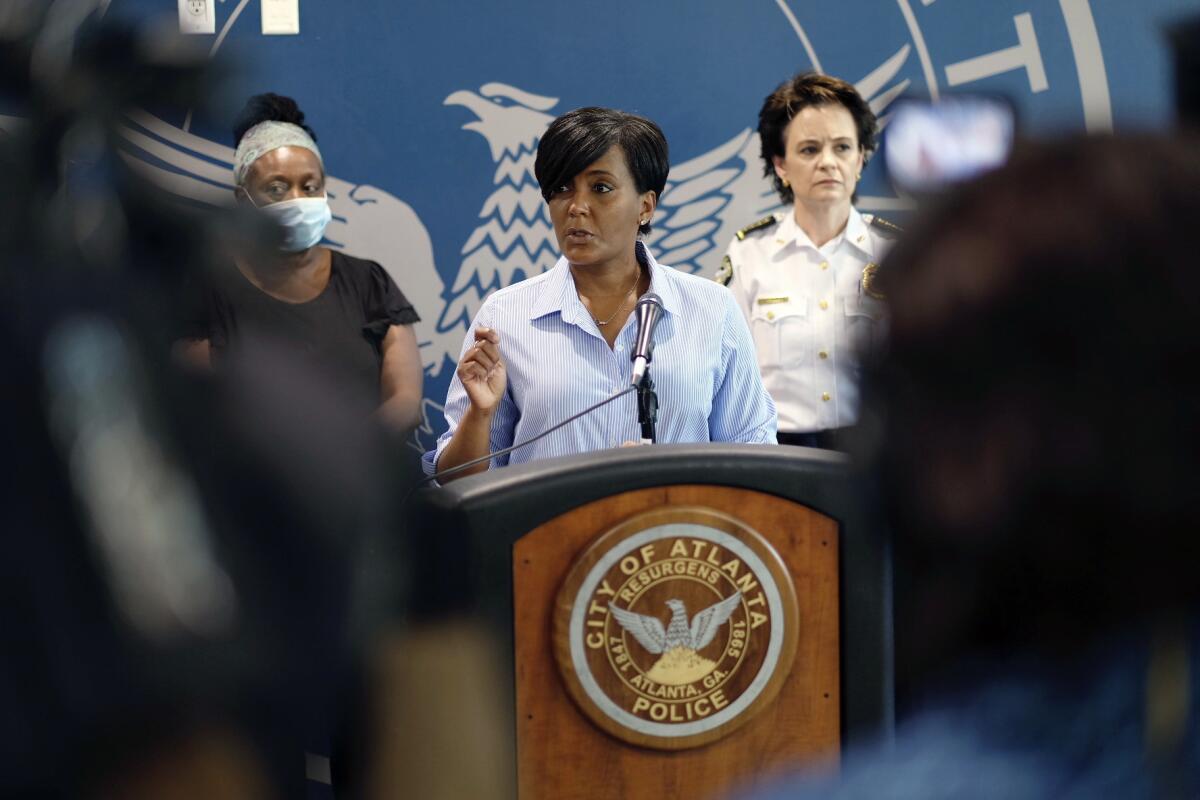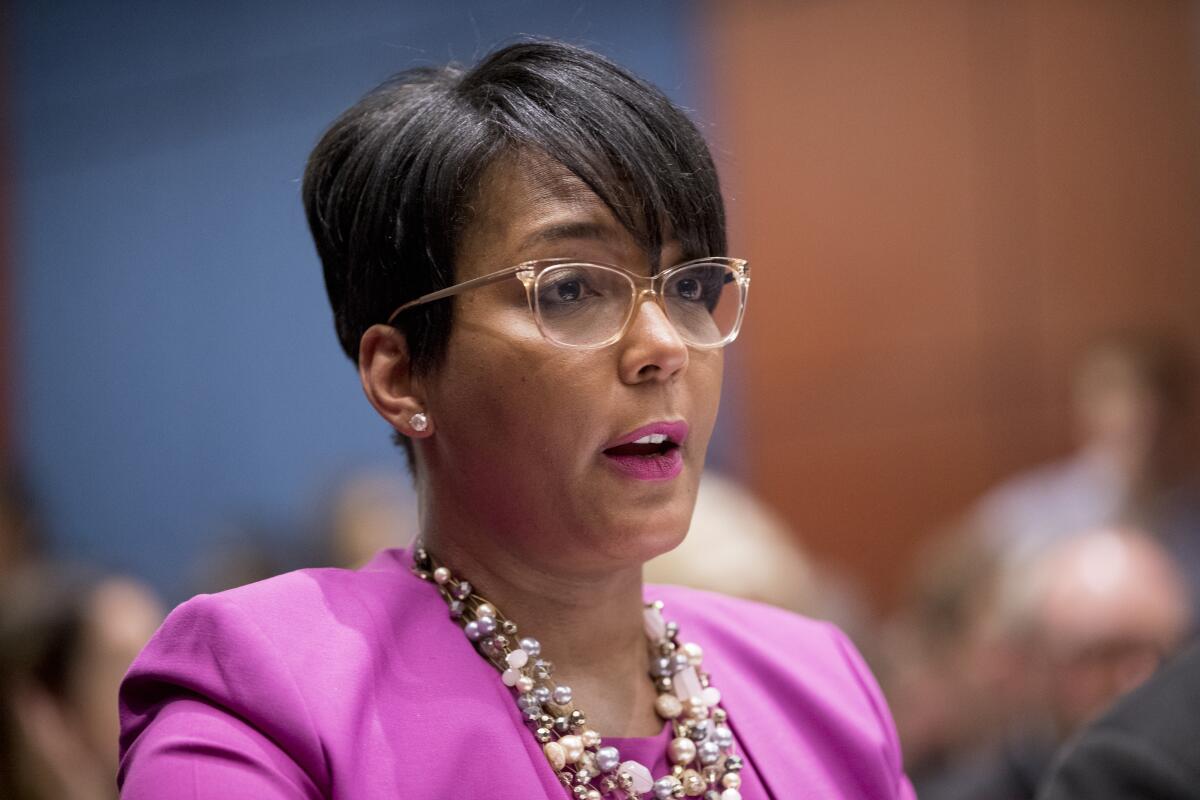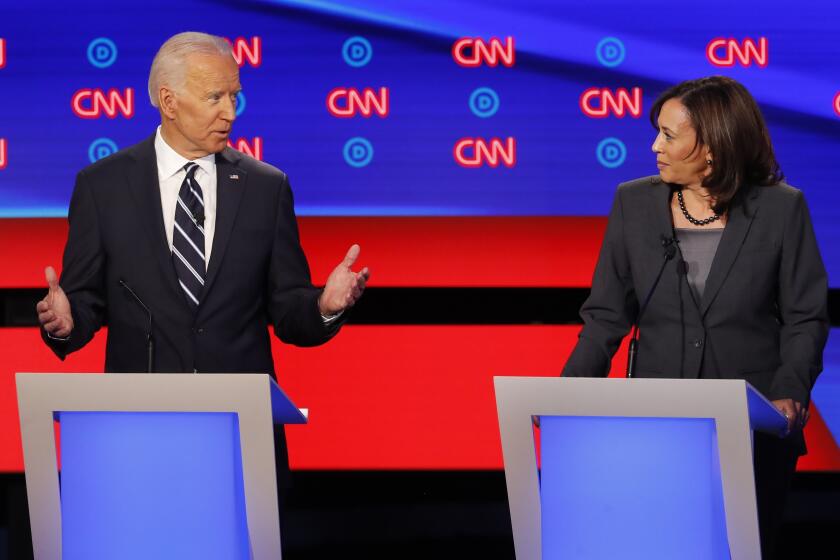Atlanta’s mayor is in the spotlight for her response to George Floyd protests and as potential Biden VP pick

- Share via
ATLANTA — When Mayor Keisha Lance Bottoms delivered an impassioned plea to quell the violence threatening her city, she spoke not just as an elected official.
She spoke as the direct descendant of slaves and as a mother of four: “When I saw the murder of George Floyd, I hurt like a mother would hurt.” Bottoms sought to soothe protesters’ pain over systemic racism and police brutality, while calling out the people who were setting police cruisers on fire and smashing the windows of the CNN Center.
“When I heard there were rumors about violent protests in Atlanta, I did what a mother would do. I called my son, and I said, ‘Where are you?’ I said, ‘I cannot protect you, and black boys shouldn’t be out today,’” Bottoms said at a May 29 news conference. “So you’re not gonna out-concern me and out-care about where we are in America. I wear this each and every day.
“When you burn down the city, you’re burning down our community. If you want change in America, go and register to vote,” her voice swelling. “Show up at the polls on June 9. Do it in November. That is the change we need in this country. You are disgracing our city.... Go home!”
Countless elected officials across the country have spoken out in the aftermath of the police killing of Floyd, which was caught on video in Minneapolis late last month. But Bottoms’ passion and tone have stood out, drawing praise from political observers at a time when she is among the politicians being vetted as a possible running mate for Democratic presidential nominee Joe Biden.
Bottoms, 50, referred questions about the vetting to the Biden campaign, which declined comment on the search for a running mate. However, Biden spokesman TJ Ducklo praised Bottoms’ guidance of her city.
“Her passion, her empathy and her strong and steady leadership are shining through during this difficult moment, and the city of Atlanta is lucky to have her leading the way,” Ducklo said.
Bottoms’ national profile has grown in recent days. She has become a regular face on cable news, such as the weekend “Sesame Street”/CNN town hall aimed at helping children understand the protests. She wrote an op-ed for the New York Times with the headline, “The Police Report to Me, but I Knew I Couldn’t Protect My Son.” She will appear on a two-part Oprah Winfrey-hosted town hall about institutionalized racism that will air Tuesday and Wednesday on more than a dozen cable stations. (Stacey Abrams, another Georgia politician being vetted by the Biden campaign, will also appear.)
Some supporters worry that in looking for a “simpatico” running mate, Joe Biden will be too cautious and make a choice that fails to excite voters.
Bottoms said that at her much-viewed May 29 news conference, she had planned to deliver an update on protests and ended up speaking off the cuff. She said she had to go home and watch video of her remarks because she couldn’t recall what she said.
“You just got it unfiltered — everything I’ve been carrying heavy in my heart and in my head over the past week, just like the rest of America,” Bottoms said in an interview. “I’m mindful — so many of the people protesting, I could be their mothers.… There’s so much anger and pain and sadness, you can feel it.”
Bottoms grew up in Atlanta, the daughter of Sylvia Robinson and Major Lance, an R&B singer who once opened for the Beatles. Once his music career faded, he turned to selling cocaine, Bottoms has said. Lance was sentenced to prison, then Bottoms’ parents divorced and her mother struggled to make ends meet.
Bottoms earned her bachelor’s degree from Florida A&M University and a law degree from Georgia State University. The attorney and former judge was elected to Atlanta’s City Council in 2009 and 2013 before winning the mayoral seat in 2017.
Along the way, she sought to blend the personal with the political, with mixed results. When she tweeted out a picture of her Christmas macaroni and cheese, she was met with repeated criticism that it looked dry.
She responded by posting video of her mom laughing at the responses, and she launched a fundraiser for the hungry in Atlanta.
When Bottoms was sworn in as mayor, some questioned whether she could emerge from the shadow of former Mayor Kasim Reed, a key ally whose administration is the subject of a federal investigation into corruption.
Early on, Bottoms emphasized transparency and sought to open up the city’s finances for scrutiny. Three months into her tenure, she asked for the resignations of more than two dozen holdovers from Reed’s administration.
She passed criminal-justice reforms, introducing a program that provided job- training for nonviolent inmates and then jobs with the city upon their release, eliminating cash bonds for nonviolent offenders and ordering Atlanta’s Department of Corrections to stop holding immigration detainees for the federal government.
In addition to her response to the protests, Bottoms has won applause for pushing back against Gov. Brian Kemp’s moves to reopen Georgia during the coronavirus crisis and her actions after Atlanta police officers were captured on video smashing in the windows of a sedan and firing stun guns at two black college students. Within 24 hours, she announced two officers had been fired and three others placed on desk duty. Six officers were eventually charged.
But critics complain she has not done enough to tackle gentrification and increase affordable housing in a city that has become a capital of income inequality, with the top 5% of households earnings 18 times more than the bottom 20%.
It’s an issue that dogged her as she stumped for Biden during the primaries. One group posted a picture on Facebook of Bottoms’ face with the words, “HELP FIND ME!”
“Last seen campaigning with Joe Biden. We need her back to do some work in Atlanta,” the post said.
Bottoms endorsed Biden in June 2019, the day after California Sen. Kamala Harris questioned his record on civil rights. Harris pointed out during a debate that Biden worked with segregationists during his long Senate career and previously opposed court-ordered busing.
Bottoms had been endorsed by Harris and New Jersey Sen. Cory Booker during her mayoral run, but she said she felt she needed to back Biden because of his service as President Obama’s vice president.
“I didn’t know him personally at the time, but I knew his heart. What was most striking to me, which was borne out in the support he’s gotten from the African American community, is that he was an older white man willing to stand beside and behind a younger black man to help lead our country.”

If she is chosen as Biden’s running mate, Bottoms could face critiques that her executive experience is limited and that she is too moderate to attract the supporters of the progressive former candidates Sens. Bernie Sanders and Elizabeth Warren.
On Thursday, when Bottoms tried to march with protesters, some in the crowd jeered and heckled her.
Iesha Muhammad, a 29-year-old Atlanta receptionist and activist, was not convinced by the mayor’s attempt to show solidarity.
“It’s very performative,” she said. “It’s for the media. They just want to say ‘Hey, we’re with you guys.’ But really they would just like us all to stop and end the protest.”
After voting for Bottoms in 2017, Muhammad said she had grown increasingly frustrated as the city continued to gentrify and black residents struggled to pay rent or buy homes. And black neighborhoods continue to be policed more strictly that their white counterparts, she said.
“She’s a black woman,” she said of Bottoms. “But, honestly, the representation and the action don’t really meet up.”
But others were appreciative of the mayor’s presence.
Earlier in the week, Antonio Brown, a young Atlanta City Council member who represents a district that includes struggling, predominantly black neighborhoods west of downtown, had urged Bottoms to join protesters.
To her credit, he said, she was there the next day.
“Even though we may not always agree on everything, I think she pays attention,” he said, adding that Bottoms understands the systemic racism facing communities of color.
“I stand alongside her because she is a progressive mayor and she cares about the people.… We need leaders who are not afraid to push the boundaries of perception of who we can become, as a community, as a city as a state, as a country.”
Mehta reported from Los Angeles, Jarvie from Atlanta.
More to Read
Get the L.A. Times Politics newsletter
Deeply reported insights into legislation, politics and policy from Sacramento, Washington and beyond. In your inbox twice per week.
You may occasionally receive promotional content from the Los Angeles Times.













